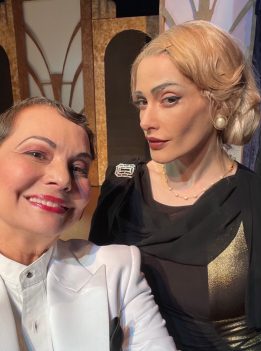At CASA 0101 Theatre, the creative wild child of Odalys Nanin opens the door to a refreshing take on legendary stars through the passionate gaze of LGBTQ forerunner Mercedes de Acosta.
By John Lavitt
Los Angeles, CA (The Hollywood Times) 02/13/23 –
I wonder if I have ever really known you —
Or if you exist at all,
And are not but a twisted, fevered, silver creation of my brain.
And the unreality of you comes over me,
Like a mist upon a lonely sea.
- Mercedes de Acosta (from the poem “Unreality”)
The charismatic lover of a bountiful array of legendary Hollywood women, the American poet, playwright, and novelist Mercedes de Acosta preferred her Cuban and Spanish roots. Despite her uncloseted life at a time of great judgment and hypocrisy, she succeeded as a working writer in Hollywood and beyond. Indeed, she is revered as an LGBTQ forerunner.
In Garbo’s Cuban Lover, writer, star, and co-director Odalys Nanin rips off the veil of patriarchal history and pushes back the shadows of shame, illuminating a forgotten piece of the Golden Age of Hollywood. Beyond de Acosta’s volatile relationship with Greta Garbo (Lydie Denier), the play also sheds light on her romantic affairs with Marlene Dietrich (Kate Patel) and Isadora Duncan (Kesia Elwin), and her passionate relationship with gay icon Poppy Kirk (Bruna Bertossi).
As the founder of the nonprofit MACHA Theatre Company, Odalys Nanin is passionate about writing, directing, producing, and performing stories about women that pull back the false curtain of constructed history. MACHA is an acronym for Mujeres (Women) Advancing, Culture, History & Art. From a post-modern perspective, Nanin deconstructs the metaphysics of male presence and domination. Garbo’s Cuban Lover is an example of these ongoing efforts. Performed at the CASA 0101, tickets are still available through Goldstar to this powerful play that should not be missed.
As the foundation stone of the show, Odalys Nanin builds her castle on the firm base of her performance as Mercedes de Acosta, allowing her fellow actors to sparkle and shine. With the support of co-director and costume designer Angela Nicholas, the actor knows when to step back and give the spotlight to her creations. At the same time, she brings to life a complex character that John Bainbridge, one of Garbo’s preeminent biographers, described as “a woman of courtly manners, impeccable decorative taste and great personal elegance … a woman with a passionate and intense devotion to the art of living.”
Beyond her co-direction of the play, the costume design of Angela Nicholas is impeccable. All the legendary stars come out in period-worthy outfits that reflect their status and beauty. Complementing the costumes, Marco de Leon’s production design is transportive and flexible. Since part of the play takes part when Mercedes de Acosta is toiling in a cramped studio writer’s room or poverty at the end of her life, the uncomfortable reality of these moments is not glossed over. On the same set, with a few shifts of furniture and illuminating visual effects by lighting designer Sammie Wayne, the beauty and wonder of Golden Age Hollywood and Paris come alive as well.
However, great costume and set design do not add much without great acting. In Garbo’s Cuban Lover, the acting is a wonder to behold across the board. Although never present, Kesia Elwin as Isadora Duncan is a consistent presence throughout the play as part of the consciousness of Mercedes de Acosta. Having died tragically before the start of the narrative, Isadora Duncan only exists in the writer’s imagination. She flutters through the play like a dream of transcendence. Still, amid such stillness, she functions as a transitional powerhouse, using movement and commentary to forward the storyline.

Perhaps the biggest challenge on stage is faced by Lydie Denier as she takes on the unforgiving role of Greta Garbo. Although she is an outstanding actor, the lack of dimensions to Garbo’s persona does prove challenging. As Wikipedia describes the Swedish legend, “Regarded as one of the greatest screen actresses, she was known for her melancholic, somber persona, her film portrayals of tragic characters, and her subtle and understated performances.”
Although Garbo was the best at playing the dark persona she assumed, her range as a person and actor often came across as limited. Melancholic and somber will only take you so far, and it proves frustrating that more of the woman behind the persona is not revealed in writing. After all, there must have been a side to Garbo that smiled occasionally. In response to this challenge, Lydie Denier uses humor and satire to balance out the representation of the dour legend. At times, the presentation of the character livens up with a touch of a wink wink to the audience.
The two performances that prove the most surprising and rewarding are by Kate Patel and Bruna Bertossi. In the opening scenes at Hollywood parties, both actors play drunken starlets that appear like two of the many empty-headed party girls in Damien Chazelle’s bloated Babylon. After their opening performances, it seems they will be trapped in one-dimensional characterizations.

Nothing could be further from the truth. Later in the play, both actors reappear in memorable and multi-dimensional roles. As Marlene Dietrich, Kate Patel reveals the German starlet’s emotional depth and loving nature. While capturing Dietrich’s stateliness and austere beauty, Patel uncovers the generous heart of the Hollywood legend. Such an uncovering reflects the truth. When Mercedes de Acosta published her controversial memoir about her loves and losses, only Dietrich responded positively without fear or judgment, continuing to correspond with de Acosta and never cutting the controversial woman out of her life. In contrast, Garbo slammed the door shut with an iciness that reflected her Northern upbringing.

As a Brazilian woman still learning English, Bruna Bertossi capably captures her character’s accents, flavors, and linguistic rhythms. Playing de Acosta’s lover and friend, Poppy Kirk, Bertossi reveals an unapologetic and pure passion. She will not apologize for loving a woman and will fight Garbo tooth and nail when the legend proves to be a disruptive and intrusive force. As Poppy Kirk, Bruna Bertossi received applause from the audience for her powerful presence that reverberates between passion and humor. Indeed, Bertossi shows great promise as an actor brimming with charisma and physical control.
American producer Irving Thalberg is the only male character in the play that exists beyond the informational level. In a telling performance by Skip Pipo (who plays all the male characters), Thalberg is never characterized by lust or desire. He does not care about the beautiful women that surround him as sexual conquests but rather as money-making machines. The only lust that fuels the producer is a desire to make box office hits. As a 21st-century rapper might say about the man, “He’s all about the Franklins.”
Perhaps the most accurate success of Garbo’s Cuban Lover is how much men are removed from the sexual equation in such a storyline. There is never a question of the lovers choosing between the cosmopolitan passion of Mercedes de Acosta and the financial protection of a man. Men are side notes that do not take up much space in the consciousness of the text. Instead, the heart and soul, and sexuality of the storyline is a feminine journey that searches for definition and serenity.
(Photography by: Anielka Gallo)





